|
In this Let People Prosper episode 69, I sit down with James Quintero, director of the Think Local Liberty project, and Dr. Derek Cohen, director of the Right On Crime project, to discuss the Texas budget, ban-the-box, and annexation.
You don't want to miss this first episode of many where we'll address a number of good, bad, and pretty good bills that influence our prosperity throughout session while giving you a heads up on which bills will be heard in committee so you can make your voice heard. In this episode we discuss the state's recommended budgets by the House and Senate and how they compare with the Conservative Texas Budget, bad bill of HB 495 related to criminal history, and a prosperity-enhancing bill of HB 347 related to annexation that builds on passage of SB 6 during the 2017 special session. #LetPeopleProsper
0 Comments
In this Let People Prosper episode 68, I interview James Quintero, Director of the Think Local Liberty project at the Texas Public Policy Foundation, about reining in skyrocketing local property taxes, increasing local debt transparency, and highlighting frivolous local spending. High taxes and debt are always and everywhere a spending problem. James makes that point clear in this episode. Don't miss it!
#letpeopleprosper Texas leads the nation in economic growth and international trade. Were Texas a country, it would have the world’s 10th-largest economy—a ranking achieved in no small part by the state’s deep involvement in international trade. Local, national, and international trade provide the ability for more extensive specialization, and each is an important component of Texas’ economy.
Great discussion on these issues with Texas Comptroller Glenn Hegar, Leila Afas of Toyota Motor Co., Representative Matt Shaheen, and Doug McCullough of the Lone Star Policy Institute. Read the TPPF report on how people prosper from NAFTA and trade. The Texas Teacher Retirement System has had massive debts for years and there is growing concern the system is moving toward insolvency. There are good options the Texas Legislature can pursue to fix the system, but they all require hard choices. Which path will policymakers take, or will they put it off?
Great discussion with Stephen Gassenberger of Reason Foundation, Monty Exter of the Association of Texas Professional Educators, and Josh McGee of the Texas Pension Review Board on TRS issues and potential solutions. Check out this recent TPPF-Reason publication that provides an overview of issues facing TRS. Perhaps no issue unites Texans across the state like the need to reduce property taxes. But any property tax reform will have consequences that affect how we fund education, pay for roads, grow our economy, improve access to health care, and more. Experts and policymakers take on this critical question and look for solutions in the 86th Legislature.
Great discussion with Dr. John Diamond from Rice University's Baker Institute, Senator Paul Bettencourt, Judge Glenn Whitley, and Representative Drew Springer. Read more about TPPF's plan to cut property taxes and find out how much you would save under this plan over time here. How much money does Texas have and what will it do with it? It’s perhaps the most important question the legislature deals with each session – and it all starts with deciding on the state’s priorities. TPPF convenes the important voices who will help answer that question in 2019.
Watch this fantastic discussion with Chairman John Zerwas, Representative Donna Howard, and Chairman John Whitmire as we discuss key issues facing Texas in the upcoming budget. In this Let People Prosper episode 67, let's discuss the importance of sustaining and improving the Texas Model of no personal income tax, relatively low taxes, relatively less government spending, and sensible regulation that allow entrepreneurs opportunities not available elsewhere. This can be boiled down to: Institutions Matter. Let's recall previous discussions highlighting these key points while noting how Texas led the way in job creation again in 2018.
#LetPeopleProsper Week 2 TXLege Happenings--Ban Income Tax, Cut Property Tax, & Free Trade: Let People Prosper EP 661/18/2019 In this #LetPeopleProsper episode 66, let's discuss what happened during Week 2 of the 86th Texas Legislature.
My op-ed on the need to ban a personal income tax in Texas in the Victoria Advocate was tweeted by Governor Greg Abbott. That op-ed also noted the need to cut the school maintenance and operations property tax with TPPF's plan of simply slowing government spending growth. And I had another piece in The Hill that noted the benefits of free trade. Finally, the Legislative Budget Board adopted a spending limit based on population growth and inflation last Friday. Near the end of the discussion (watch starting at 6:20), Chair Jane Nelson notes, at Speaker Dennis Bonnen’s request, that The Honorable Talmadge Heflin said TPPF wouldn’t include Harvey-related money in budget figures. This is correct as long as it is transparent and one-time funding. It's a pleasure to work with him every day. Regarding the recent budgets, we posted a blog post with more information comparing the House and Senate budget recommendations with the Conservative Texas Budget. #letpeopleprosper In this Let People Prosper episode 65, let's discuss the legislative priorities set by the Texas House and Texas Senate in their recently proposed recommended budgets. While there's much to wade through, here’s what I’ve derived so far from the House and Senate recommended budgets. Of course, there will be many discussions over these budgets during the next several months until a final budget is determined and approved by both chambers, but these recommendations give a good indication of the priorities of each chamber, much like your family's budget.
The first thing to note is that both chambers have prioritized public education and property tax relief to a certain extent. Both chambers have relatively large increases in public education, but the details will need to be worked out throughout the legislative session to determine the allocations to public education spending and tax relief. In general, there should be a push for spending current resources more wisely within public education before considering any new money. In other words, there could be a large amount of money to buy down the school maintenance and operations property tax as outlined in TPPF's property tax plan (view how much you would save over time with our online calculator). The House budget noted first in the table below shows that the recommendations for state funds and all funds (state and federal) are greater than the Conservative Texas Budget limits based on growth of 8% in population and inflation in the last two fiscal years. The amounts appropriated for 2018-19 budget are from the LBB's Fiscal Size-Up for an apples-to-apples appropriation comparison. I've also noted the Texas Comptroller's Biennial Revenue Estimate (BRE) amounts. The House budget allocates $9 billion towards pub ed/property tax relief but is contingent on bills passed for those. There aren’t specific allocations of that $9 billion for pub ed or property tax relief. The Senate budget is noted second and is below our CTB limit for state funds but is above our limit for all funds. The Senate budget provides $6 billion in pub ed/prop relief to the tune of $3.7 billion for increased teacher pay ($5,000) and $2.3 billion for prop relief. I've excluded $7.1 billion in federal funds from both chambers' 2020-21 budgets for disaster recovery after Harvey as these should be one-time, unexpected expenses. Overall, the Senate budget is in better shape to meet the CTB limits to keep the average taxpayer's ability to pay for government from unnecessarily growth and doesn't include use of the ESF like the House does of $633 million. Bottom line: There’s work to do to limit government spending and provide tax relief to #letpeopleprosper. More on this comparison here. TPPF's Policy Orientation Recap & Texas' LBB Spending Limit: Let People Prosper Episode 641/13/2019 In this Let People Prosper episode 64, let's discuss the Texas Public Policy Foundation's Policy Orientation, which was a sold out event that helps define the narrative for the 86th Texas Legislature, and highlight the recent spending limit set by the Legislative Budget Board.
The following are the panels that I moderated or participated in some capacity and my key takeaways with resources:
The other big news on Friday was that the Legislative Budget Board (LBB) set the state's spending limit for the upcoming 2020-21 budget. This spending limit is on only general revenue not dedicated by the constitution which is less than half of the total budget. While statutorily the spending limit should be based on growth in personal income, last session the LBB chose the rate based on population growth and inflation. This time the spending limit is 9.89% for the 2020-21 budget, which is based on an increase of 8.39% in population growth and inflation and 1.5% for Harvey. This is another good sign that the LBB continues to use a measure for the limit that better matches the average taxpayer's ability to pay than the inappropriate growth rate of personal income. This spending limit is in-line with the recent BRE increase of 8.1% in general revenue-related funds and provides funds available to cover needed expenses along with property tax relief. Specifically, the Legislature could use half of the funds of about $4.4 billion for spending and 90% of the rest of the funds of about $4.1 billion to buydown the school maintenance and operations property tax. Texas Comptroller's Revenue Estimate Proves Room for Property Tax Relief: Let People Prosper EP 631/7/2019 In this Let People Prosper episode, let's discuss today's release of the Texas Comptroller's Biennial Revenue Estimate report. This report is key because the state's balanced budget amendment means this estimate provides the projected amount of taxpayer money available for the 86th Texas Legislature to appropriate during the upcoming legislative session that starts tomorrow. The revenue estimate indicates that the Legislature can pass a budget that funds legislative priorities while including taxpayers in the budget process by lowering property taxes within the average taxpayer's ability to pay. The report notes that the 2020-21 budget will have available an estimated $265.6 billion in all funds (state funds and federal funds) (6.7% increase), $176.9 billion in state funds (7.3% increase), and $119.1 billion in general revenue-related funds (8.1% increase). Included in these amounts is an available fund balance of $4.2 billion remaining from the 2018-19 budget. The 86th Legislature has a grand opportunity to pass what could be the third straight Conservative Texas Budget (CTB) while prioritizing taxpayers in the budget process to lower property tax bills and improve education. Specifically, the Conservative Texas Budget Coalition, which includes the Texas Public Policy Foundation and 15 other member organizations, has set conservative spending limits on the 2020-21 budget of $234.1 billion in all funds and $156.5 billion in state funds based on an 8 percent increase in population growth plus inflation over the previous two fiscal years above current appropriations. There are also 2018-19 supplemental bill limits of $3.6 billion in state funds and about $4.4 billion in all funds to cover unfunded expenses in the 2018-19 budget. But these amounts could be quickly reached as there's a $1.8 billion amount likely needed to fund a delayed payment to transportation and $2 billion in unfunded Medicaid expenses. Legislators will need to appropriate these dollars wisely so the 2018-19 budget can be the second straight CTB. But the Conservative Texas Budget is a maximum to just keep in line with the average taxpayer's ability to pay. Given skyrocketing property taxes, the Legislature should add taxpayers in the budget process and limit general revenue-related funds spending so that the rest can be used for property tax relief through the TPPF proposal here. Many have claimed that Texas can't afford TPPF's proposal, but this revenue estimate shows that Texas clearly can and must for the sake of prosperity in the Lone Star State. If the upcoming 86th Texas Legislature limited spending of general revenue-related funds to just 4% growth, that would provide $4.4 billion in new spending on budget items while allowing the rest of the 4% of those funds under the CTB of $4.1 billion to go to lowering the school maintenance & operations (M&O) property tax.
The school M&O property tax is about 45% of the total property tax burden. The $4.1 billion would amount to an almost 8% biennial cut in that portion of the property tax, leaving more money in the pockets of taxpayers. The school M&O property tax would continue to be lowered each session given taxpayers are part of the budget process and fully eliminated within about a decade. This process could be sped up by lowering the rainy day fund cap and using excess funds, which the rainy day fund amount could grow to more than $15 billion, to provide property tax relief. Although slowing the growth rate of property taxes over time is good step towards reform, taxpayers want lower property tax bills for relief. The TPPF proposal works to lower property tax bills, and the Texas Comptroller's revenue estimate proves that it can and must be done. #LetPeopleProsper In this #LetPeopleProsper episode 62, I wish you all a Happy New Year! Thank you for watching this vlog, subscribing, and sharing it with your family and friends.
Each year I choose a word that keeps me on pace to reach my goals. My word this year is "flourish." I started doing this last year with the word "prosper," which last year was very prosperous for my family, and know that this year will be even better than the last. Try it! 2019 will be a busy year as the Texas Legislature will be in session starting January 8. I look forward to discussing the big issues, like property taxes and spending restraint, and providing updates here with guests along the way. We will also discuss interesting things in Congress with the Democrats taking over the House, President Trump will likely act on trade and regulatory issues, the Federal Reserve will be on the hot seat, and so much more. May we learn more about our God-given world together. Please send me questions and show ideas along the way. You can always find the show notes on the blog page at vanceginn.com. Blessings to you and yours! #LetPeopleProsper Despite the economic success of the Texas Model of fiscally conservative governance, a skyrocketing local property tax burden remains one of the state’s most pressing policy challenges. Property taxes have been growing faster than Texan’s ability to pay for them, increasing the need to eliminate them. You get less of whatever you tax. This key economic insight suggests the best type of taxation does the least economic harm, achieved by limiting government spending to only securing liberty. The evidence is clear that Texas should never have a personal income tax. There is nearly a consensus that is true, but there is a growing consensus that Texas should eliminate property taxes that keep Texans renters forever. Property taxes are an inefficient type of tax. They are based on primarily subjective valuations by appraisal review boards and determined tax rates by local tax entities with little to no feedback from citizens. Given the rising property tax burden and its inefficient collection mechanism, they should be eliminated in exchange for a more efficient, slower-growing sales tax based on objective market transactions that would help appropriately remove taxes on capital (i.e. property)—the driver of the wealth of states. Property taxes are more regressive than a sales tax. Opponents of a sales tax say it is too regressive, whereby people with lower incomes people pay a larger share of their income to taxes than those with higher incomes. The Texas Comptroller’s recent report confirms that both sales taxes and property taxes are regressive, according to the “suits index” (see following two tables), but suggests property taxes are less regressive. However, this analysis (and others like it) do not account for the fact that sales taxes are paid once at purchase yet property taxes are paid annually, hurting low- and fixed-income Texans the most because the costs compound over time. A property tax also keeps people from getting their first home and kicks many people out of their home and business. Appropriately accounting for these cumulative costs indicates a property tax is more regressive. Texas should ultimately have only a single-legged barstool in the form of a broad-based sales tax. Some talk about the need for a three-legged stool of taxation. These legs include a sales tax, property tax, and a personal income tax. Because Texas appropriately doesn’t have the latter, the argument is that there is a need for the other two. But that’s incorrect. Texas needs the most efficient tax system possible to fund limited government. That’s done by expanding the sales tax base as wide as possible to not pick winners and losers to keep the rate as low as possible. There are paths to swapping out city and county property taxes with a higher local sales tax rate if the state doesn’t broaden the base. This is also a good option as it provides a direct funding source for local governments’ maintenance and operations if, and only if, they eliminate the property tax with a revenue neutral swap. Ideally, the sales tax rate would not be allowed to ratchet up further after the swap and the property tax could never come back. The school district maintenance and operations property tax, which comprises about 45 percent of the total property tax burden in Texas, could also be swapped out with a sales tax. A broader sales tax base could allow the rate to fall. Here is an overview of possible rates and sales tax bases to eliminate the school district M&O property tax in Texas with 2017 data, which the ideal option would be to expand the base and not tax property, as property is capital that supports economic prosperity. Texas should limit spending to limit taxes. While sales tax collections can be more volatile than property tax collections from economic changes, sales taxes better reflects taxpayers’ ability to pay than a property tax that they have little control over. Also, property taxes often don’t reflect the economic climate but rather the whims of appraisal districts and local officials that hurt property holders in the process when their incomes are falling. More importantly though, Texas governments must practice spending restraint so that excessive spending doesn’t drive taxes higher than taxpayers’ ability to pay. High taxes are always and everywhere a spending problem. This is why there is need to limit spending growth to no more than population growth and inflation, two key measures that reflect the ability to pay from more people and wage growth that’s highly correlated with inflation. By practicing spending restraint, excess taxpayer dollars can be used to lower the sales tax rate after a swap or could even be used to cut the school M&O property tax in the meantime until the elimination of school districts’ maintenance and operations property taxes.
By practicing fiscal restraint and eliminating all taxes in Texas except for a broad-based sales tax, the Texas Model would support even greater prosperity for all Texans. |
Vance Ginn, Ph.D.
|
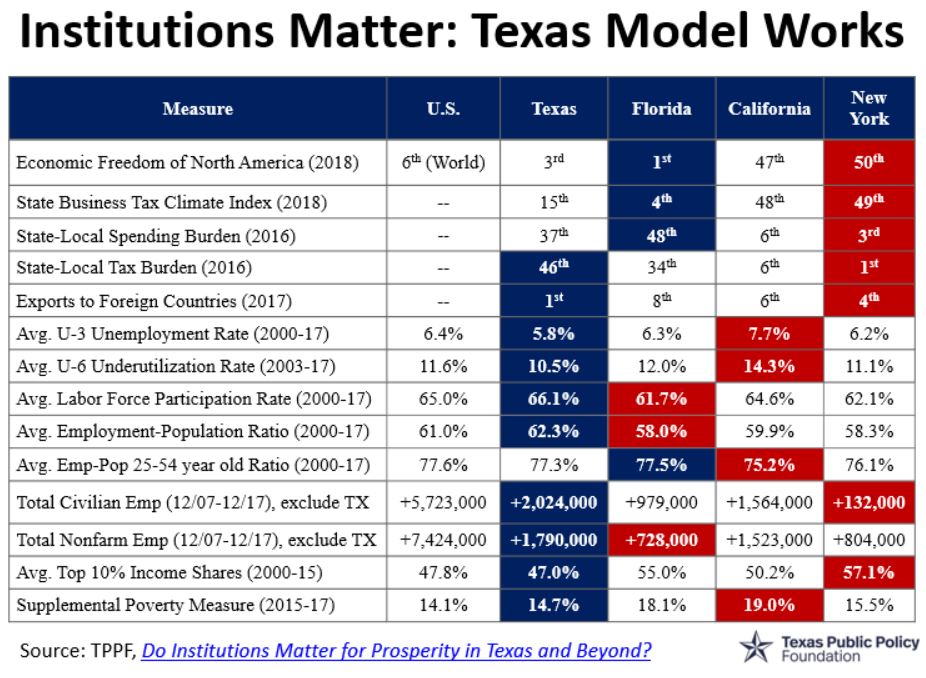
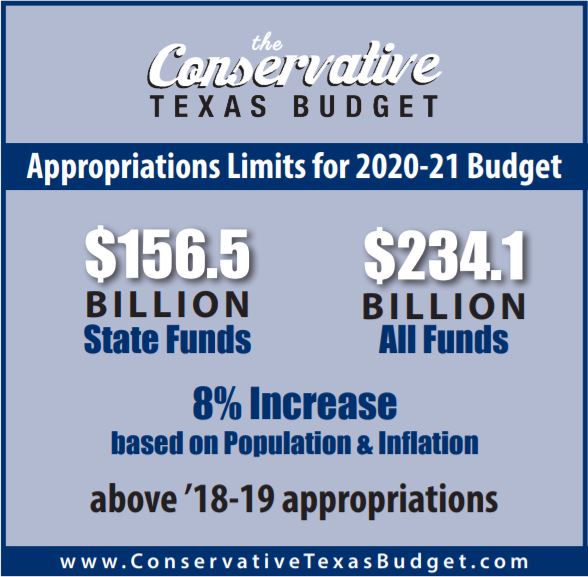
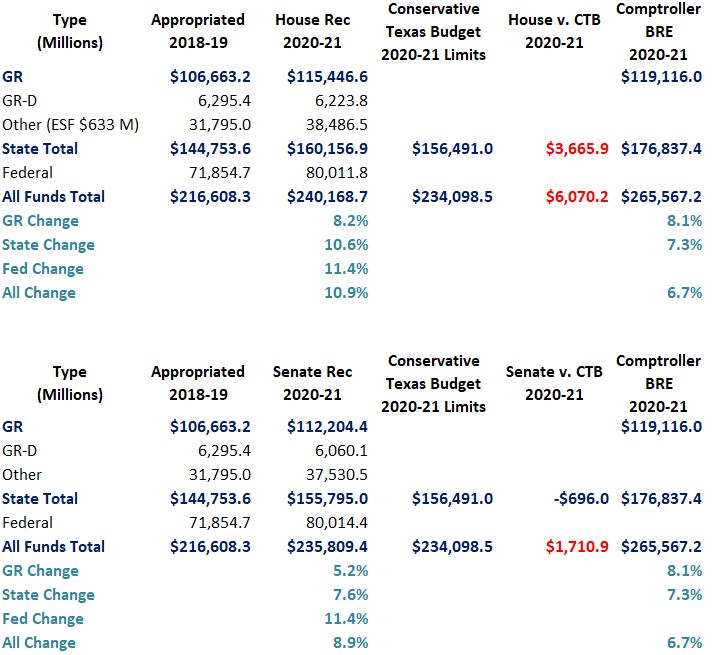
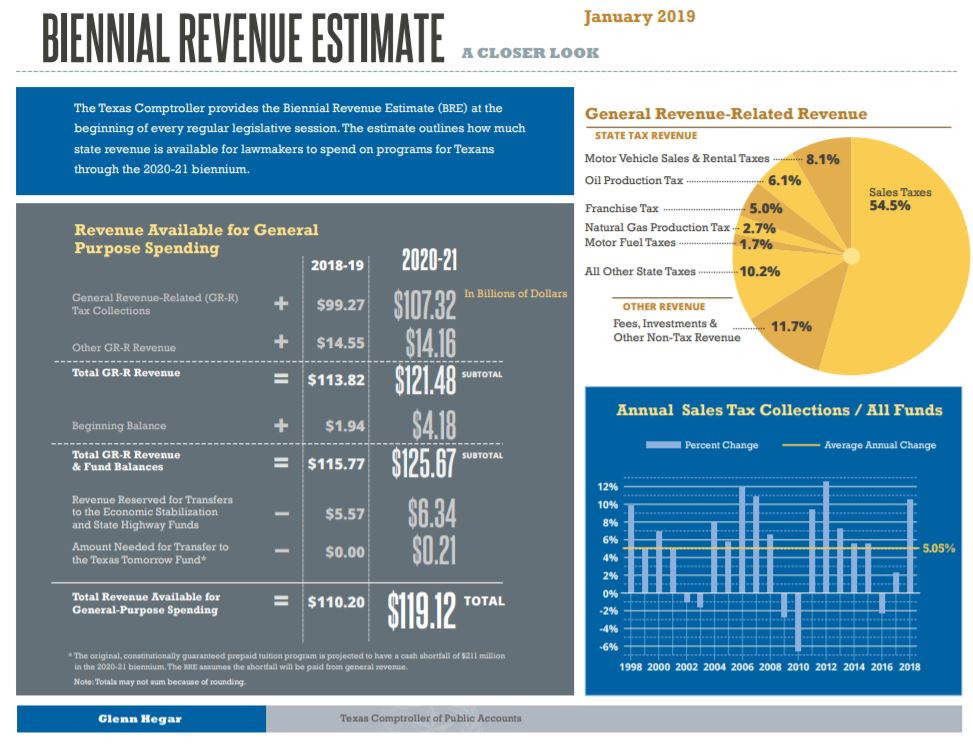
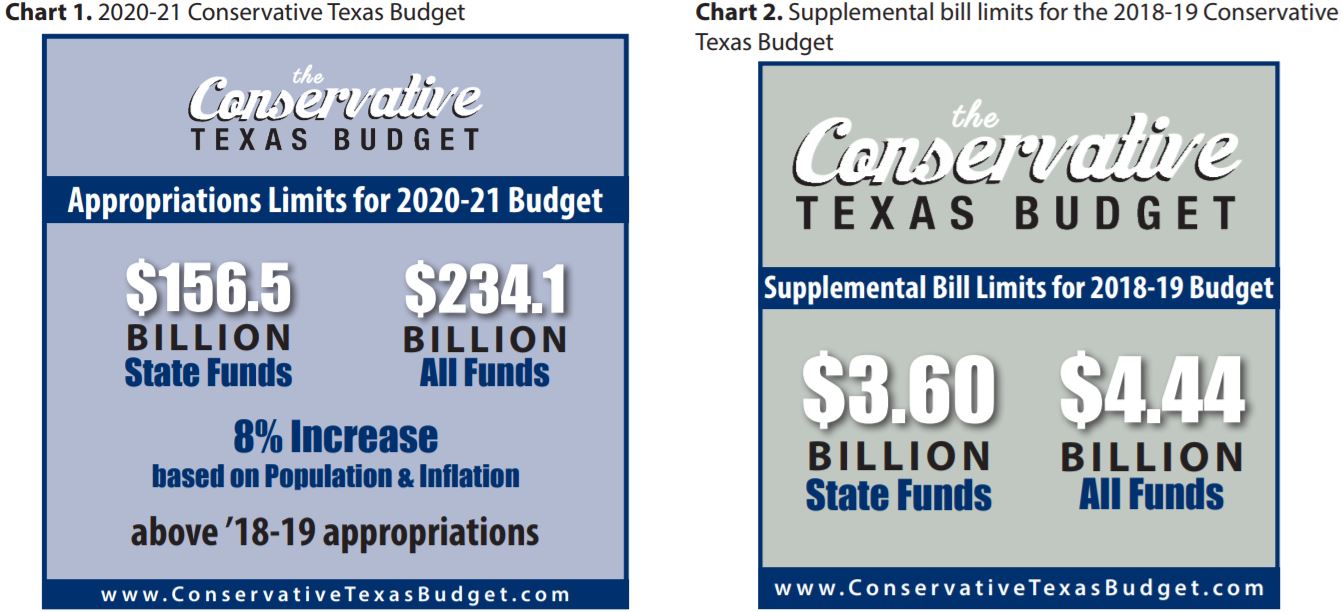
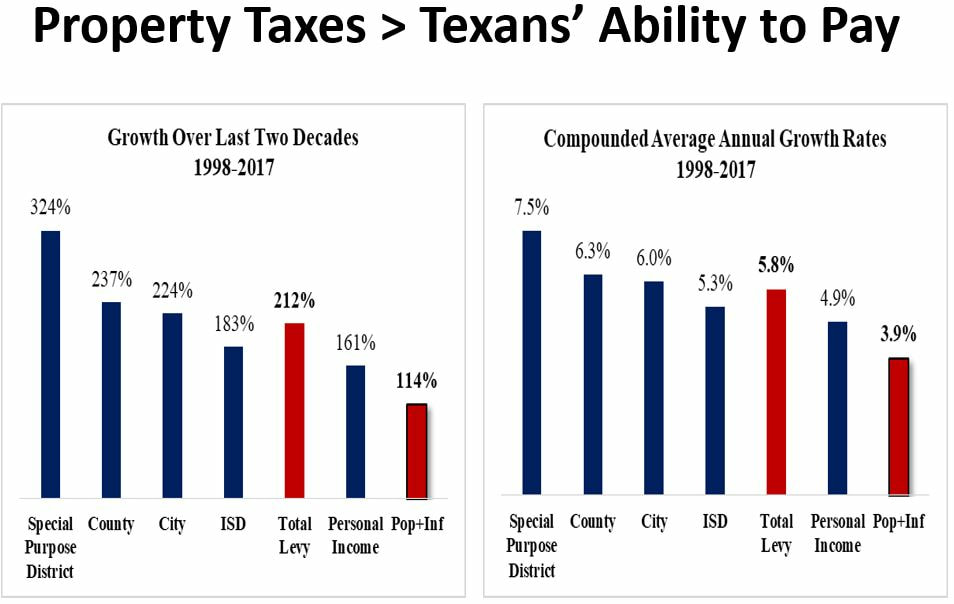

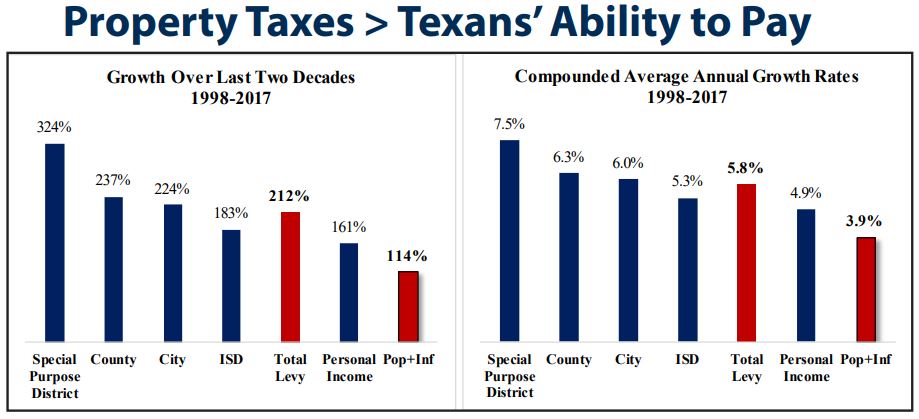

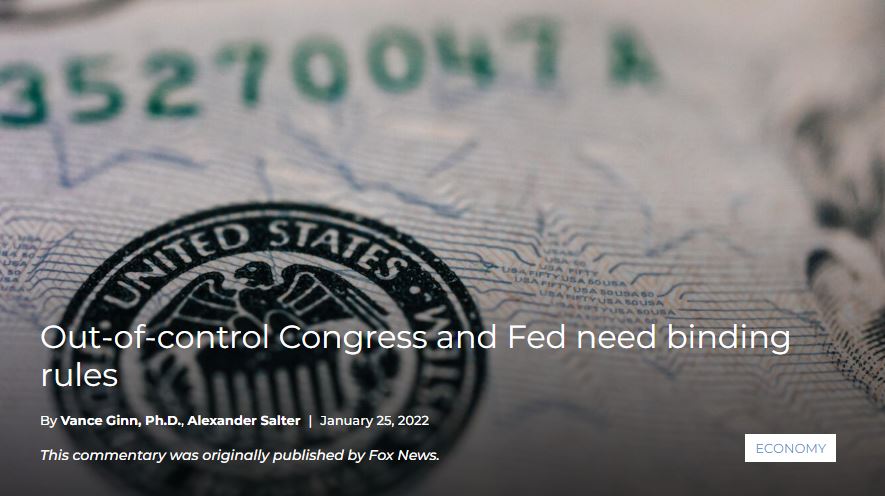
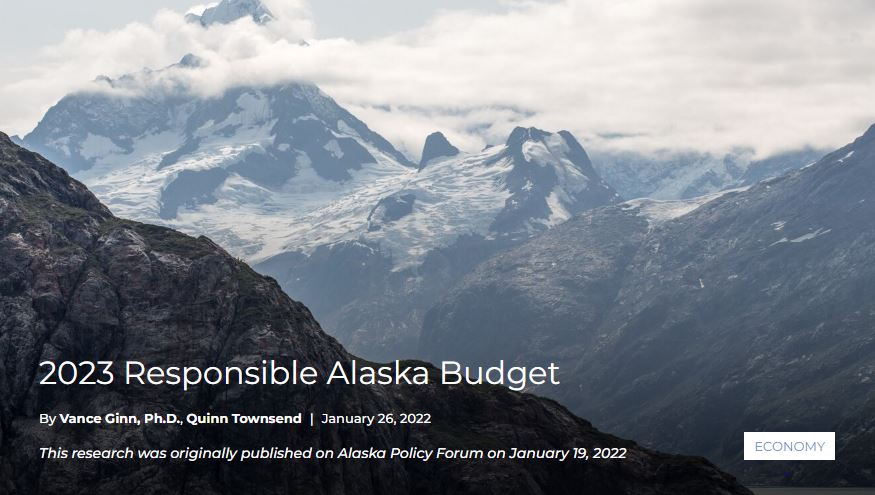
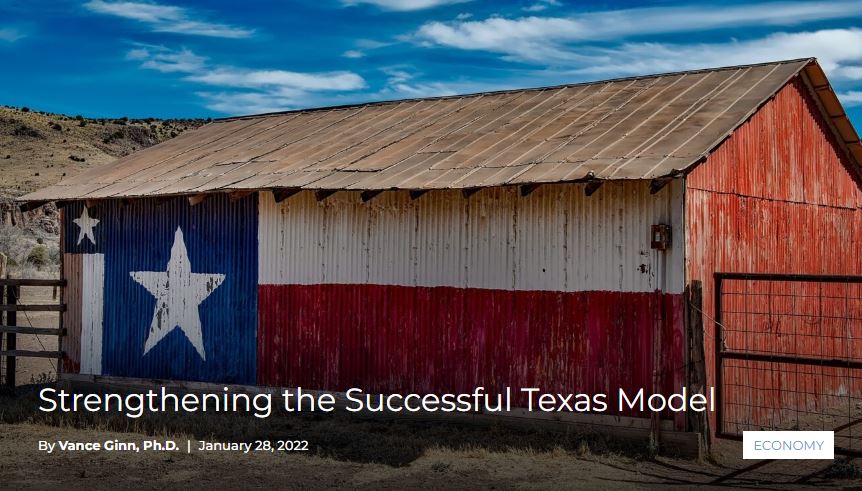
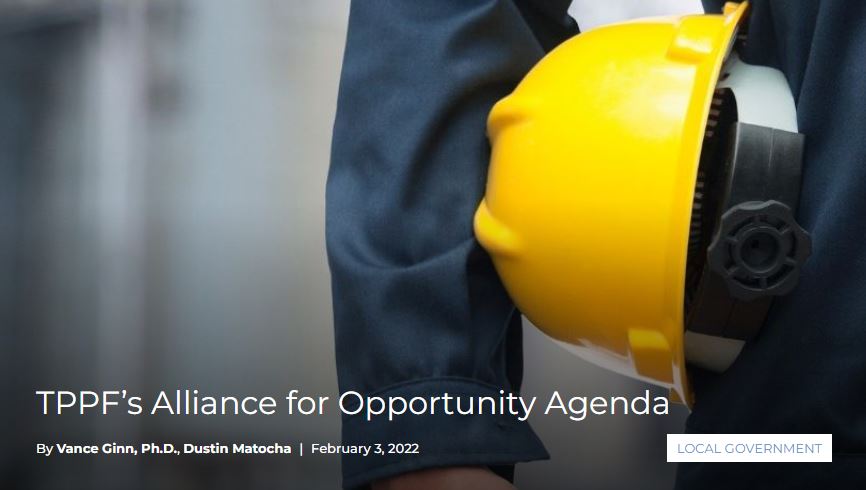
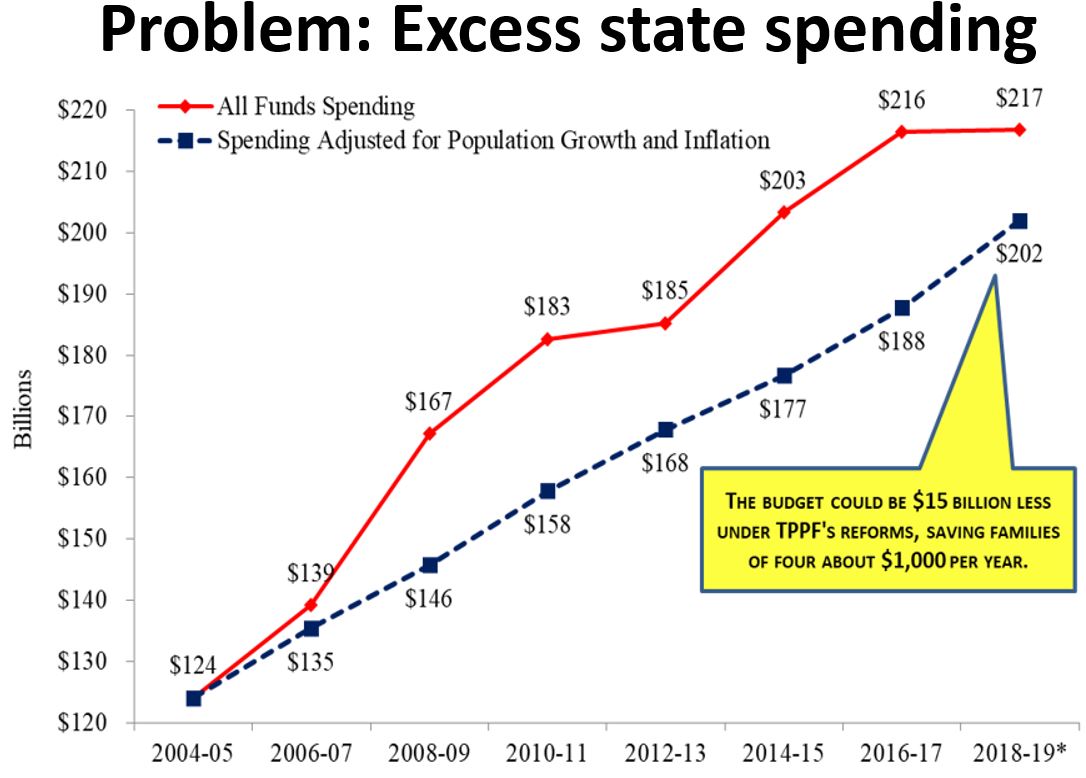

 RSS Feed
RSS Feed